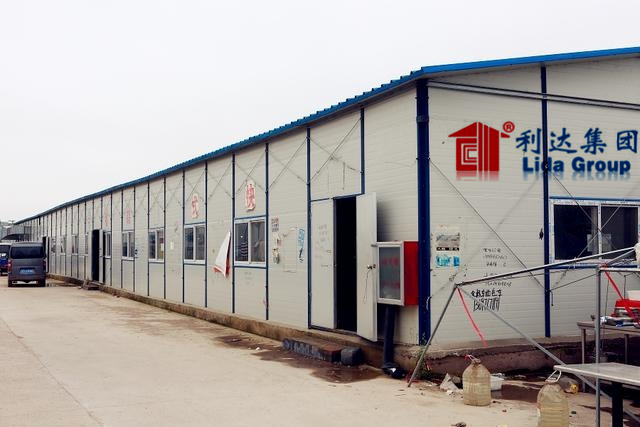Tel: 0086-532-88966982
0086-532-88965892
Website: www.lidajituan.com
E-mail: sales@lidajituan.com
Head office: 5th Floor, Building A, Dalen Center, 180 Haier Road, Qingdao, 266000, China
Why Modular Houses Are the Future of Sustainable Constructions in 2025
Classification:Industry News
Release time:2025-04-30 09:00
Why Modular Houses Are the Future of Sustainable Constructions in 2025
The construction industry stands at a crossroads. With climate change accelerating and urbanization demanding faster, smarter solutions, the way we build needs a radical rethink. Enter modular houses—a game-changer that’s quietly reshaping the future of sustainable constructions. By 2025, these innovative structures are poised to become the gold standard for eco-conscious developers, forward-thinking contractors, and anyone tired of the delays, waste, and environmental toll of traditional building methods.
So, what makes modular houses so revolutionary? At their core, modular homes are a type of prefab building, constructed in sections within climate-controlled factories before being transported and assembled on-site. Unlike conventional constructions, which are exposed to weather delays and on-site errors, modular techniques ensure precision and efficiency. But it’s not just speed that’s driving the shift. Sustainability is baked into every step of the process, from material sourcing to energy-efficient design.

Take the example of Lida Group, a leading China prefab house supplier that’s become synonymous with innovation. Their modular projects aren’t just boxes stacked together—they’re thoughtfully designed homes and commercial buildings that rival traditional structures in aesthetics and durability. In a recent project in Scandinavia, Lida Group delivered a 50-unit modular housing complex that achieved net-zero energy consumption. The secret? Solar panels integrated into the roofing during factory production, triple-glazed windows, and walls insulated with recycled materials. This isn’t a niche experiment; it’s a scalable blueprint for the future.
One of the most compelling arguments for modular constructions is their drastic reduction in waste. Traditional building sites generate staggering amounts of debris—think off-cut lumber, excess concrete, and discarded packaging. Modular factories, by contrast, recycle up to 90% of their materials. Steel frames are precision-cut by robots, minimizing errors, while bulk purchasing of insulation and glass slashes excess. For contractors, this efficiency isn’t just eco-friendly—it’s cost-effective. A study by the Modular Building Institute found that prefab buildings can reduce construction waste by up to 50%, translating to significant savings for developers.
But sustainability isn’t just about materials. Modular houses excel in energy performance long after they’re built. Because modules are assembled in factories, seams and joints are airtight, eliminating the drafts that plague many traditionally built homes. Lida Group takes this further by incorporating passive design principles, such as strategic window placement for natural lighting and ventilation, reducing reliance on artificial heating and cooling. In a climate-conscious world, these features aren’t just nice-to-have—they’re expected.

The role of contractors in this shift can’t be overstated. Adopting modular methods requires a mindset change, but the payoff is immense. Imagine a project where 60% of the work is completed off-site, shielded from rain delays or labor shortages. On-site assembly becomes a streamlined process, often taking weeks instead of months. For developers, this speed means earlier ROI—a critical factor in fast-growing urban markets. And because factories like those operated by Lida Group handle the heavy lifting, contractors can focus on fine-tuning details rather than managing chaotic build sites.
Critics often argue that modular houses lack the customization of traditional builds. But this stigma is fading fast. Advances in digital design tools now allow buyers to tweak layouts, finishes, and even structural elements before production begins. Want a modular house with a rooftop garden or a prefab office with a curved glass facade? Suppliers in China and beyond are proving it’s possible. Lida Group’s recent collaboration with a Swiss architect on a luxury modular villa—complete with a floating staircase and smart home tech—shows how flexibility and flair are becoming hallmarks of modern prefab buildings.
Looking ahead to 2025, the modular revolution is set to accelerate. Governments worldwide are tightening emissions regulations, and modular constructions offer a clear path to compliance. In the EU, for instance, new buildings must meet near-zero energy standards by 2025—a target far easier to hit with factory-controlled processes. Meanwhile, in rapidly urbanizing regions like Africa and Southeast Asia, modular techniques provide affordable housing solutions without sacrificing quality.
The economic angle is equally compelling. As a China prefab house supplier, Lida Group leverages the country’s manufacturing prowess to keep costs competitive. Bulk production of modules, coupled with innovations like 3D-printed components, drives down prices without cutting corners. For developers, this means high-quality buildings at a fraction of traditional costs—and for homeowners, it means accessible, sustainable housing in markets where affordability is a growing concern.
Of course, challenges remain. Misconceptions about modular durability persist, though real-world examples are dispelling myths. When Hurricane Ida battered the U.S. Gulf Coast in 2023, modular homes built to Florida’s strict wind codes outperformed many stick-built houses. And while upfront costs can be higher, the long-term savings in energy and maintenance often balance the scales.
By 2025, modular houses won’t just be an alternative—they’ll be the default for sustainable constructions. As suppliers like Lida Group refine their techniques and contractors embrace the efficiency of prefab, we’ll see fewer construction sites cluttered with waste and more factories humming with green innovation. The future of building isn’t just about erecting structures; it’s about crafting them wisely. Modular houses prove that sustainability and sophistication can go hand in hand, paving the way for a world where every building is a step toward a healthier planet.
prefab house,modular house,constructions,china suppliers
Contact Us
Head Office: 5th Floor,Building A,Darron Center,No.180,Haier Road,Qingdao, 266000,China
Tel: 0086-532-88966982 88965892 Fax:0086-532-88965571
WhatsApp:+86 13793209022
Mobile/Wechat:+86-15166671720
Email: sales@lidajituan.com Website: www.lidajituan.com
Alternate Website: www.lidamodularhouse.com
Head Office: 5th Floor,Building A,Darron Center,No.180,Haier
Road,Qingdao, 266000,China
Tel: 0086-532-88966982 88965892
Fax:0086-532-88965571
Email: sales@lidajituan.com
Website: www.lidajituan.com
Alternate Websit: www.prefabhousecn.com
Wechat/WhatsApp:+86-13793209022
Copyright(c)2023 All Rights Reserved SEO Business license

